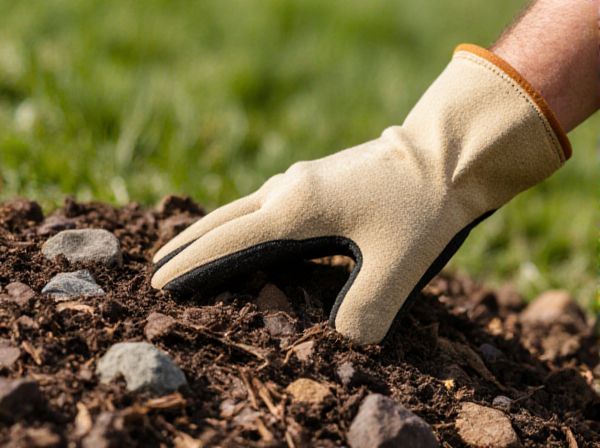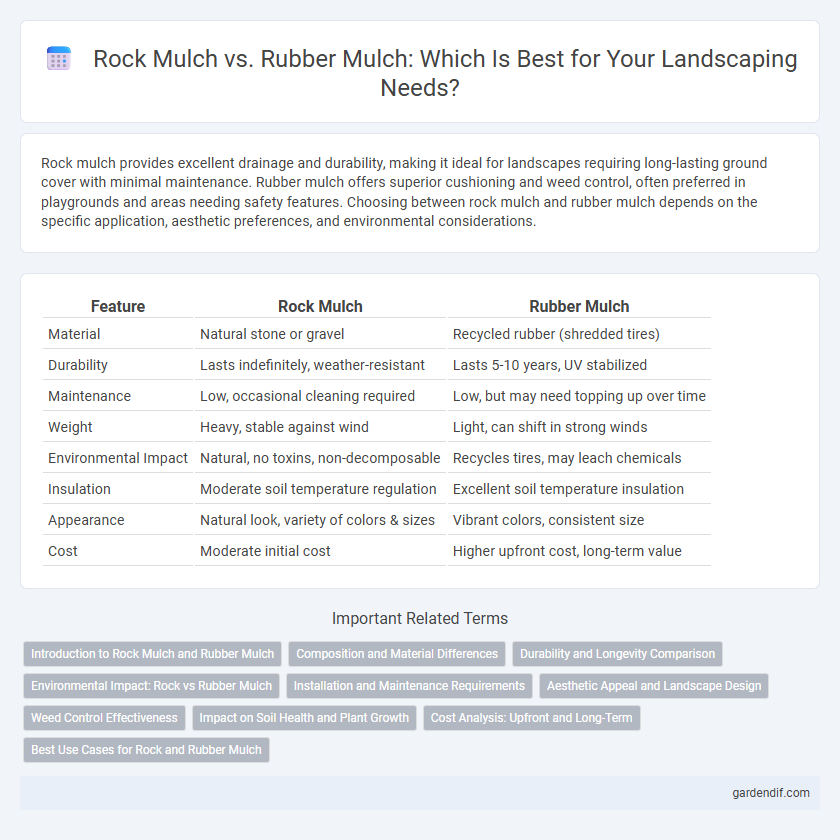
Rock mulch vs rubber mulch Illustration
Rock mulch provides excellent drainage and durability, making it ideal for landscapes requiring long-lasting ground cover with minimal maintenance. Rubber mulch offers superior cushioning and weed control, often preferred in playgrounds and areas needing safety features. Choosing between rock mulch and rubber mulch depends on the specific application, aesthetic preferences, and environmental considerations.
Table of Comparison
| Feature | Rock Mulch | Rubber Mulch |
|---|---|---|
| Material | Natural stone or gravel | Recycled rubber (shredded tires) |
| Durability | Lasts indefinitely, weather-resistant | Lasts 5-10 years, UV stabilized |
| Maintenance | Low, occasional cleaning required | Low, but may need topping up over time |
| Weight | Heavy, stable against wind | Light, can shift in strong winds |
| Environmental Impact | Natural, no toxins, non-decomposable | Recycles tires, may leach chemicals |
| Insulation | Moderate soil temperature regulation | Excellent soil temperature insulation |
| Appearance | Natural look, variety of colors & sizes | Vibrant colors, consistent size |
| Cost | Moderate initial cost | Higher upfront cost, long-term value |
Introduction to Rock Mulch and Rubber Mulch
Rock mulch consists of natural stones such as gravel, lava rock, or river stones that provide excellent drainage and durability for landscaping and gardening. Rubber mulch, made from recycled tires, offers long-lasting color retention, resistance to decay, and excellent shock absorption for playgrounds and garden paths. Both options serve as effective ground covers, with rock mulch emphasizing natural aesthetics and rubber mulch focusing on safety and environmental reuse.
Composition and Material Differences
Rock mulch consists of natural stones such as gravel, river rocks, or crushed stone, providing durability and excellent drainage for landscaping. Rubber mulch is made from recycled tire materials, offering a lightweight, flexible surface that resists decomposition and repels pests. The inorganic nature of rock mulch contrasts with the synthetic composition of rubber mulch, influencing factors like heat absorption and environmental impact.
Durability and Longevity Comparison
Rock mulch offers exceptional durability, with a lifespan often exceeding several decades, as it resists weathering, decay, and UV damage. Rubber mulch also provides substantial longevity, typically lasting up to 10 years, but may degrade faster under constant exposure to sunlight and extreme temperatures. Both mulches minimize the need for frequent replacement, but rock mulch generally guarantees extended durability in landscaping applications.
Environmental Impact: Rock vs Rubber Mulch
Rock mulch is an environmentally sustainable option due to its natural composition, longevity, and ability to improve soil drainage without releasing harmful chemicals. Rubber mulch, made from recycled tires, helps reduce landfill waste but may leach toxic substances like heavy metals and oils over time, posing risks to soil and groundwater quality. Choosing rock mulch supports ecosystem health by avoiding potential pollution, whereas rubber mulch offers waste reduction benefits but requires careful consideration of environmental trade-offs.
Installation and Maintenance Requirements
Rock mulch requires minimal installation effort as it simply needs to be spread evenly over the soil, but it may demand periodic raking to maintain an even surface and prevent compaction. Rubber mulch installation involves laying down a weed barrier fabric before spreading the rubber pieces, which helps reduce weed growth but adds to initial setup time. Maintenance for rubber mulch is low since it does not decompose, but occasional cleaning may be necessary to remove debris and keep it looking fresh.
Aesthetic Appeal and Landscape Design
Rock mulch offers a natural, timeless aesthetic that enhances garden beds with varied textures and earth-toned colors, complementing diverse landscape designs. Rubber mulch provides vibrant color options that maintain their brightness over time, adding a modern, uniform look ideal for contemporary or playground settings. Both mulches resist fading and require minimal maintenance, allowing for flexible design choices based on the desired visual impact.
Weed Control Effectiveness
Rock mulch offers moderate weed control by creating a physical barrier that limits sunlight, but its weight and gaps can allow some weed growth. Rubber mulch provides superior weed control due to its dense, interlocking pieces that inhibit weed seed penetration and retain heat to suppress germination. Both mulches reduce the need for chemical herbicides, but rubber mulch generally requires less maintenance for weed management.
Impact on Soil Health and Plant Growth
Rock mulch improves soil drainage but can increase soil temperature and hinder moisture retention, potentially stressing plants during dry periods. Rubber mulch is durable and reduces weed growth but may release harmful chemicals that negatively affect soil microbial activity and plant health. Both mulches alter soil conditions differently, making selection critical based on specific soil health and plant growth needs.
Cost Analysis: Upfront and Long-Term
Rock mulch typically involves higher upfront costs due to material weight and installation labor but offers exceptional durability and minimal maintenance, resulting in lower long-term expenses. Rubber mulch has a lower initial price and easier installation but may require replacement or topping up every few years, increasing cumulative costs over time. Evaluating total cost of ownership, rock mulch provides a more cost-effective solution for permanent landscaping, while rubber mulch suits budget-sensitive projects needing short-term aesthetic appeal.
Best Use Cases for Rock and Rubber Mulch
Rock mulch is ideal for areas requiring excellent drainage and long-lasting ground cover, such as pathways, driveways, and xeriscaping, where moisture conservation is less critical. Rubber mulch excels in playgrounds, garden beds, and sports fields due to its cushioning properties, durability, and ability to retain moisture, promoting plant health and safety. Selecting between rock and rubber mulch depends on specific landscape needs, emphasizing either water management and aesthetic permanence or impact absorption and moisture retention.
Rock mulch vs rubber mulch Infographic

 gardendif.com
gardendif.com